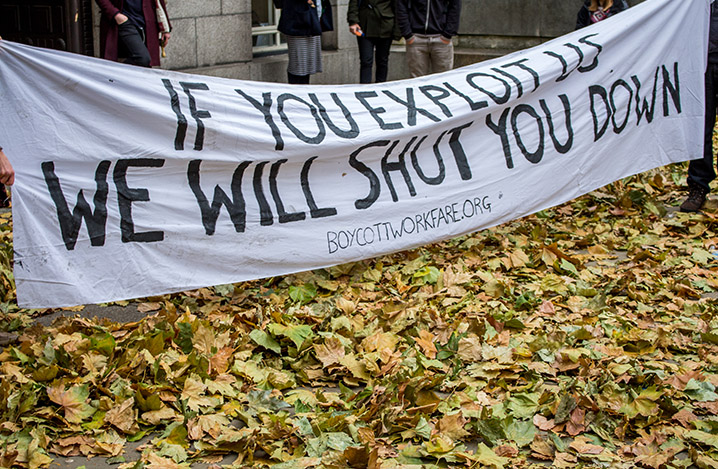Solidarity in the Struggle Against Psychological Coercion
Over the past few years, I’ve been preoccupied with documenting and fighting back against state-sponsored psychological coercion – a form of coercion and manipulation that’s become a central feature of workfare and a daily experience for people claiming benefits. My work, in partnership with Robert Stearn and others, is part of a growing body of testimony, research and activism (by claimants, grassroots unions, mental health and disability rights activists) that aims to expose and resist psycho-compulsion, defined here as the deliberate use of psychological techniques, underpinned by sanctions or the threat of sanctions, to discipline and punish claimants.
I emphasise the state, because the use of psychology in this way is not incidental or accidental, but is embedded in government policy in the UK and across much of Europe, Australia and the USA. Programmes designed to enforce changes in attitudes and beliefs about work and to impose an approved work personality, rooted in positive affect, (better described as mandatory cheerfulness), feature in a wide range of Department for Work & Pensions (DWP) contract specifications for the (once) lucrative welfare-to-work and ’employability’ sectors. We’re seeing the rise of psychological conditionality (the requirement to demonstrate a certain attribute or mindset e.g. ‘motivation’ or ‘positive change’ as a condition of receiving benefits or other resources e.g. cheap food).
There is also an increasing use of psychology to explain unemployment and to classify claimants. This includes bogus constructs like ‘psychological resistance to work’, ’employability’, ‘job ready’ ‘entrenched worklessness‘ and ‘job search self-efficacy’. The ‘work resistant personality’ and ‘willingness to violate norms concerning work’ are concepts used by Adam Perkins in his book The Welfare Trait, which has received positive press in many places. Senior politicians from various parties frequently contribute to this demonising discourse. The current Health Secretary, Jeremy Hunt, has said: ‘those reliant on benefits lack the dignity & self-respect of those who earn all their own money’. Meanwhile, all the British Psychological Society has had to say is that ‘tests’ on claimants should be conducted by qualified psychologists. Narratives of institutional psychology function to undermine resistance to work. And psychology, like public health, has become complicit in state attacks – economic and ideological – on those who dare to refuse work.

Increasingly, there are similarities in the kind of psychological coercion experienced by both claimants and workers, especially precarious workers ‘forced to navigate the border zone between work and welfare’, as Ivor Southwood describes it. Psychology is a primary source of cultural ideas about the ‘psycho-social benefits of work’ that so often justifies no pay, low pay and lengthy periods of ‘waiting for a wage’. Whether through forced unpaid labour, internships, traineeships or mandatory ‘volunteering’, psychological discourse has helped the state and employers to rebrand precarity and insecurity as opportunity and liberation.
Meanwhile, the reverse is true as this also contributes centrally to stigmatising people who are unemployed or receiving work-related benefits. To be worthy of a job, no matter how badly paid or demeaning, what is required is a certain kind of personality: the positive attitude described by the Confederation of British Industry as the ‘foundation of employability’. Psychology is fundamental to the shift from ‘what you have to do’ to get benefits (apply for jobs, attend interviews etc), to ‘what you have to be‘. ‘How to achieve a mindset that appeals to employers’ as one course puts it, to become ‘the sort of person who can get a job’. ‘Employability’ isn’t a set of skills or attributes required for a specific job or job offer. Rather, it is an approved, generic upbeat state that demonstrates an appropriate psychological profile: confident, motivated, flexible, optimistic, aspirational.
Psycho-social accounts of the ostensible positive impact of work on confidence, self esteem and dignity also legitimise the work cure and other state-funded psycho-interventions designed to force claimants to understand that work is good for you.
The discourse of psychological deficit – unemployment as a psychological disorder – is a growth market for psychologists and allied professionals in the ‘welfare-to-work’ industry (those who are paid to “activate” claimants and those who profit from their unpaid labour). These developments authorise the extension of state or state-contracted surveillance to psychological characteristics and in the case of ‘psychological treatment’ in job centres and ‘job coaches in GP surgeries’, permit the state to set therapeutic goals for people who are poor: those who are out of work, not working enough, not earning enough and/or apparently failing to seek work with sufficient application.
Whether it is managing the personality of claimants or workers – we see an attempt by employers and the state’ to bring the whole self into productivity. The ‘all purpose positivity’ harvested for profit, theorised by Kathi Weeks, Ivor Southwood and others. Happiness recast as a disciplinary issue – as Ivor Southwood describes it in the case of agency workers in his powerful book ‘Non-stop Inertia’. And as Pan Hustej describes in his account of a mandatory work activity ‘compliance doubt’, raised when he refused to state that he was happy to work in a charity shop:
“You are requesting from me to be positive about something negative that happened to me, something negative perpetrated against me. I’m requested to do MWA, I’m obliged to do it by law, I’m going to do it. But demanding from me to declare that I’m happy to do it, you’re not going to get that from me”.
So here we have it: refusal of positive affect as an act of resistance.
What’s happening in the UK now is an intensive effort to escalate mandatory work cures through ‘JobCentre take over’ as the DWP ‘aspires to join up all public services to get local people back to work – including transport and housing.’ This means moving ’employability’ into more and more spaces; a shift from putting psychological services into job centres to moving the job centre function into schools, libraries, food banks and now GP surgeries. At centre of this is the Work & Health programme (replacing the Work programme), which aims to merge health and employment, with a shift in focus to the longer term unemployed, disabled people and those with health conditions.
Health professionals, already fluent in ‘strengths-based discourse’, will be central to this strategy, with a raft of measures supporting the imposition of work cures: jobs on prescription, setting employment as a clinical outcome and allowing job coaches to directly update a patient’s medical record. Statements like “embed employment into the wiring of the healthcare system” and ‘integrating employment support into the map of medicine’ are starting to appear. The case for mandatory treatment for people with long term conditions (first flagged up in the Tory Manifesto) is currently being reviewed, including whether benefit entitlements should be linked to ‘accepting appropriate treatments or support’:
“people who might benefit from treatment should get the medical help they need so they can return to work. If they refuse a recommended treatment, we will review whether their benefits should be reduced“.
These developments are akin to the emotional labour required in many minimum wage jobs in the service sector. Mandatory courses claimants are sent on replicate and reinforce the imposition of a narrowly defined and specific ‘workplace personality’ which is required before you even get the job:
“You have to show us that you really want this,” he challenged me, like he was an X Factor judge and I the contestant desperately seeking his endorsement. “Do you just want the work, to earn your money and go home? Or do you want a career here?”
One consequence of all this is that fighting workfare and fighting waged exploitation are more easily seen as one struggle. It’s less easy to set workers against claimants. We’re seeing growing solidarity between the resistance to psycho-coercion, grassroots struggles for better pay & conditions for migrant workers and the resurgence of anti-work politics, notably from a disability rights perspective. A protest against putting job coaches in GP surgeries in North London, was organised by Mental health resistance network, Recovery in the Bin, Boycott Workfare and Disabled People Against Cuts with support from United Voices of the World as well as Psychologists Against Austerity. The attempt to put job coaches in GP surgeries helped to expose common experiences. So the fight for sick pay also becomes a fight against ‘jobs on prescription’ and a fight to stop health professionals using the ‘fit note’ to force people back to work. Activists from the survivor movement, with in-depth experience and analysis of psycho-coercion (within the benefits and the mental health systems) are bringing a unique perspective, as well as brilliant traditions of satire and subversion, forged through Mad Pride and other protest movements. The refusal of spoiled identities.
As we resist psycho-coercion and forced unpaid labour, we also resist the use of psychology to enforce the reification of work and to obscure issues of class power and privilege. Insubordination to the work ethic is potentially more subversive than ever before. As the Italian feminist Maria Dalla Costa put it, “We have worked enough”.
Lynne Friedli is a freelance researcher, involved with @boycottworkfare and other initiatives
